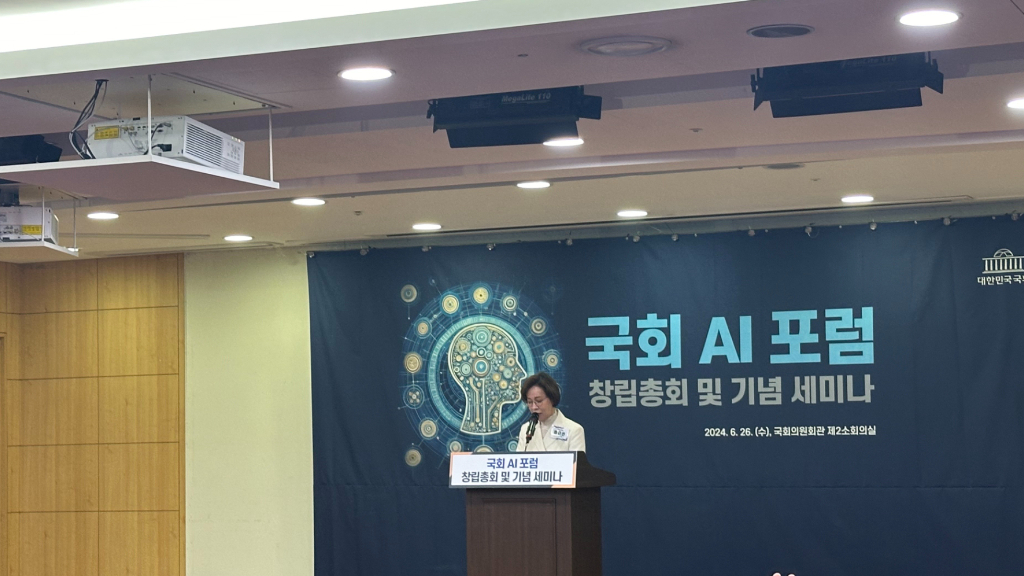또한 AI 관련 법안이 12건이 발의됐지만 입법은 0건으로, 규제 자체가 없는 탓에 불확실성이 산업 성장을 가로막기 때문에 규제 범위를 명확히 한 AI 기본법을 도입하는 전략을 추진해야 한다고 입을 모았다.
26일 국회 AI 포럼 창립총회·세미나 개회
국가 자주성 보호…소버린 AI 모델 개발 必
AI 기본법 촉구...안전한 AI 육성·불확실성 제거
맥킨지의 보고서에 따르면, AI의 도입 후 향상된 생산성 규모는 2조 6천억불에 달한다. 전 세계적으로 AI가 개발 속도가 점점 빨라지는 가운데, 산학연 전문가들은 우리나라 정부는 독자적인 AI 개발 촉진을 위해 규제가 아닌 지원을 강화할 때임을 주장했다.
또한 AI 관련 법안이 12건이 발의됐지만 입법은 0건으로, 규제 자체가 없는 탓에 불확실성이 산업 성장을 가로막기 때문에 규제 범위를 명확히 한 AI 기본법을 도입하는 전략을 추진해야 한다고 입을 모았다.
이번 포럼 공식 출범과 함께 21대 국회에서 임기 만료로 자동 폐기됨에 따라 무산된 AI 기본법 발의가 22대 국회에서 여야 공조로 재입법을 추진한다.
국회의원연구단체 '국회 AI 포럼' 주최로 26일 국회의원회관에서 국회 AI 포럼 창립총회 및 기념 세미나가 개최됐다. 국회 AI 포럼은 국회의원, 기업인 학계 전문가들이 창립한 플랫폼으로, AI 기술 발전에 따른 윤리적, 사회적 문제 해결의 목표한다.
이날 행사에는 이인선, 조승래 대표의원의 개회사 및 환영사를 시작으로 네이버 AI 이노베이션 하정우 센터장의 기조연설, 김앤장 강현정 변호사, 모두의연구소 김승일 대표, 디지털플랫폼정부위원회 AI 데이터분과 오순영 위원의 발표가 이어졌다. 또한 네이버 유봉석 대표를 비롯해 구글코리아, 야놀자, 카카오 등 유수의 기업이 대거 참여했다.
하정우 센터장은 기조연설에서 AI의 현주소를 다각도로 바라보고, 우리나라의 소버린 AI 진출을 위한 AI 개발에 있어 국회에서의 적극 지원을 요구했다. 특히 “환각 등 기술적 한계, 악용 사례 등의 사례보다 국가가 AI 경쟁력이 없는 것이 가장 큰 위협"이라며 정부의 적극 투자를 요구했다.
미국, 일본, 프랑스, 캐나다 등 해외 주요 국가는 이미 적극적인 생성 AI를 기반으로 '소버린 AI' 확보에 나서고 있다. 2023년 일본은 소프트뱅크에 보조금 680억원을 지급했으며, 2024년 3,700억원을 추가로 지급한 바 있다. 캐나다는 지난 4월 총액 2조 4천억원의 패키지 투자를 이어가고 있는 것으로 나타났다.
하정우 센터장은 "국가의 독자적인 AI를 확보하지 못하면, AI 개발을 위해 필요한 전기, 인터넷, 교통망 같은 기반 기술에 종속되고, 외국 AI 모델의 가치관에 편향된 AI로 정체성 및 문화가 종속돼 장기적으로 경제 성장 기회를 잃을 수 있다"고 주장했다.
그러면서 "AI 산업 생태계가 구축된 나라는 현재 미·중·한 외에는 없으나 올해 말에는 모르겠다"며, "국가는 GPU를 대량으로 구매하고, 역량있는 민간기업이 운영토록 하여 학계 R&D를 지원해야 한다"고 말했다. 또한 "특히 정부와 산학연이 원팀으로 동맹을 맺어 소버린 AI 개발에 힘쓰면, 글로벌 경쟁력 갖출 수 있다"고 제언했다.
오순영 디지털플랫폼정부위원회 AI 데이터분과 위원은 “미국은 AI 육성을 위해 간섭을 줄이고 자국 중심의 AI 규제를 펼치고 있다”며, “AI 인재들의 71%가 기업에 있는데, 정부와 국회는 개발자들의 역량 강화를 위해 판을 만들어 줘야 한다”고 주장했다.
또한 “AI 관련 법안 자체가 없는 것이 문제로, 시기가 늦어지면 안전한 AI를 키우지 못 한다”며, “진흥이냐 규제냐 문제를 떠나 이미 어느 정도 갖춰진 틀을 가지고 법제화를 서둘러야 한다”고 촉구했다.
국회 AI 포럼 연구책임의원 더불어민주당 조승래 의원은 “법은 숙고해 만드는 게 중요하며, AI 정의부터 한국의 특수성을 고려하며 적극적으로, 구체적으로, 본질적으로 속도감 있게 하겠다”고 말했다.
